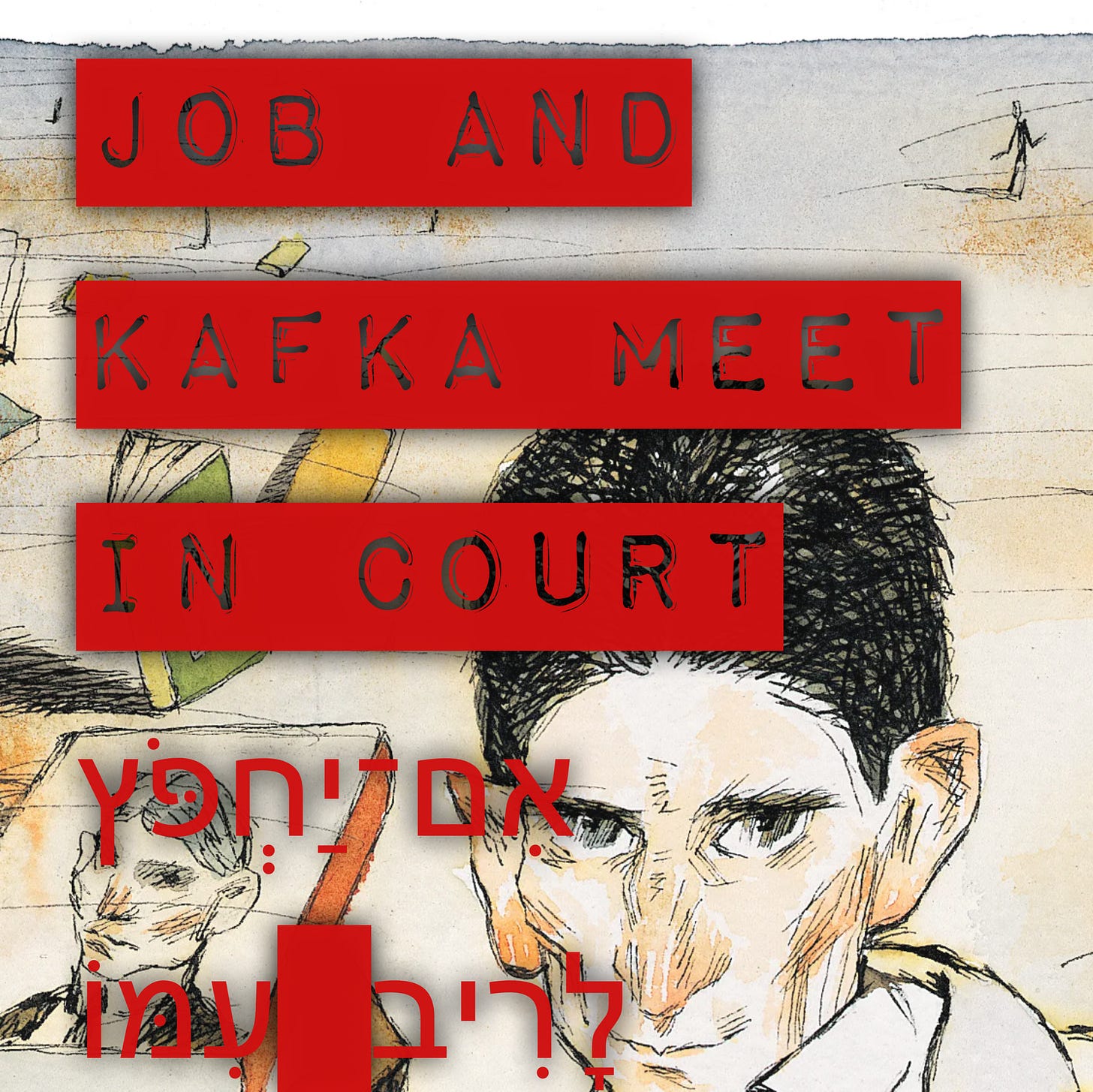“Someone must have been telling lies about Josef K., he knew he had done nothing wrong but, one morning, he was arrested.”
Franz Kafka, The Trial
By the time we get to the ninth chapter of Job - the hurting human wants to put God on trial - but he senses, just like Kafka’s hero - that he doesn’t stand a chance.
In Job 9:2-4, Job contemplates the impossibility of challenging God. He acknowledges that, in theory, if one could bring God to trial, the case would be hopeless from the start:
אׇמְנָם יָדַעְתִּי כִי־כֵן וּמַה־יִּצְדַּק אֱנוֹשׁ עִם־אֵל׃
אִם־יַחְפֹּץ לָרִיב עִמּוֹ לֹא־יַעֲנֶנּוּ אַחַת מִנִּי־אָלֶף׃
חֲכַם לֵבָב וְאַמִּיץ כֹּחַ מִי־הִקְשָׁה אֵלָיו וַיִּשְׁלָם׃
"How can a mortal be righteous before God? Though they wished to dispute with God, they could not answer God one time out of a thousand. God’s wisdom is profound, and God’s power is vast. Who has resisted God and come out unscathed?"
Job 9:2-4
This is a moment of profound tension in the text—Job is consumed by the desire to stand in judgment against his cruel creator, but he recognizes that the very system of divine justice is stacked in God’s favor. It’s a legal battle in which Job cannot hope to prevail, not because his arguments lack merit, but because the very foundation of the court—God’s absolute power—precludes any possibility of success.
Was Kafka inspired by Job? Like Josef K., Job finds himself facing an all-powerful, inscrutable system that renders any attempt to confront it futile. In Kafka's world, as in Job’s, the law is not merely a set of principles to guide justice, but an inescapable and often absurd force that operates beyond the individual’s control. The system is not designed for the righteous to prevail—it exists to perpetuate itself, indifferent to the plight of those who fall within its grasp.
This theme of a judicial system turned against the individual has an eerie resonance with contemporary events in different nations worldwide - including Israel. The ongoing debate over judicial reform has sparked fears that Israel's justice system could become increasingly politicized, losing its independence and fairness. Critics argue that this shift risks turning the courts into mere instruments of political power, where justice itself becomes compromised and arbitrary. Much like Job’s lament, and Kafka’s terrors - the fear is that there will be no fair trial—no opportunity for true justice to prevail—because the system is no longer built on impartial principles but is rather swayed by the political winds.
Yet, even in the depths of Job’s despair, there remains a glimmer of something else: the unyielding belief in the possibility of redemption. Despite his overwhelming sense of helplessness, Job continues to ask the question—“Where are you?”—because he has not given up entirely on the idea of justice or meaning. Similarly, despite the challenges faced in Israel today, there are many who continue to fight for a fair and impartial justice system, one that can stand firm against political pressures.
And what would Kafka say? As the world celebrates 100 years since his death, an exhibit in Jerusalem’s National LIbrary probes all things Kafka including his fascination with the Bible and the years he spent studying Hebrew. The library’s impressive structure right across the street from the Israeli Knesset presents nothing less than a Kafkaesque reality where even Job would have likely paused to appreciate the complexity of past, present and future -- hopeful that the wisdom of the ages will triumph with justice -- beyond petty political ambitions and dangerous ideological whims.
Perhaps, as Job’s story reminds us, justice is not just the result of a single trial, but a continuous, often painful, struggle to uphold principles of fairness and integrity. There may be no quick answers, no immediate triumphs, but the quest itself—the refusal to accept a world in which justice is only a tool of the powerful—offers the first step toward hope.
Below the Bible Belt: 929 chapters, 42 months, daily reflections.
Become a free or paid subscriber and join Rabbi Amichai’s 3+ years interactive online quest to question, queer + re-read between the lines of the entire Hebrew Bible. Enjoy daily posts, weekly videos and monthly learning sessions. 2022-2025.
Become a Paid Subscriber? Thank you for your support!
#Job #IYOV #Job9 #hebrewbible #כתובים #Ketuvim #Hebrewbible #Tanach #929 #איוב #חכמה #labshul #belowthebiblebelt929
#Kafka #thetrial #legalism #godontrial #judicialreform #JobmeetsKafka #Kafkaesque #peace #prayforpeace #nomorewar #hope #peaceisposible #life’sbigquestions #Israelinationallibrary #Kafka100 #pursuejustice




My Austrian secondary school German teacher overdosed us 17 year olds so badly on Kafka that I totally avoided him in my subsequent degree studies (Comparative Literature and German). But nevertheless I do have a copy of Der Prozess on my bookshelf, and the novel's final sentence tells me about the difference between a test from God and human-made nightmares: "Wie ein Hund!" sagte er, es war, als sollte die Scham ihn ueberleben. ["Like a dog!" he said, it was as if shame should survive him.] Whereas for Job, it is a test to lead him to the insight that his Redeemer lives, and from which he emerges better.